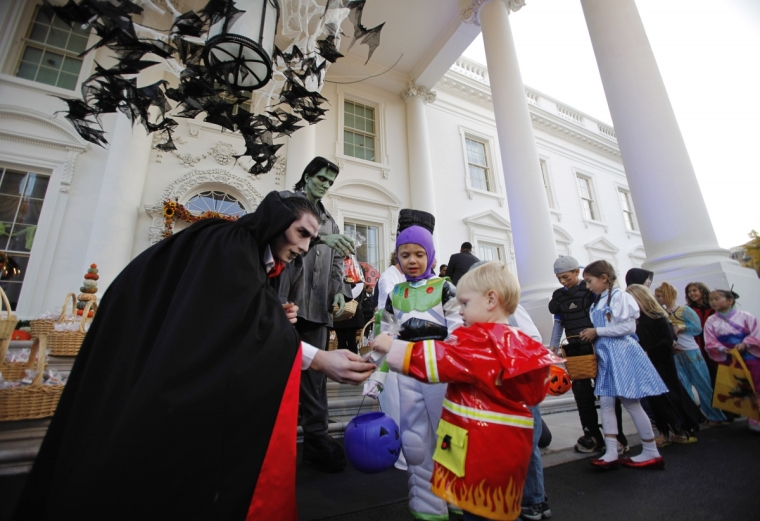Evangelicals deeply divided on Halloween, poll says

NASHVILLE, Tenn. (Christian Examiner) – Evangelical and weekly churchgoers are deeply divided on celebrating Halloween, although at least 50 percent of each group either say they avoid it completely or simply ignore its "pagan elements," according to a LifeWay Research survey.
The 2015 poll asked 1,000 U.S. adults: "When you consider the pagan origins of Halloween, which is closer to your attitude?"
Even handing out candy to neighborhood children—provided you're not stingy—can improve your reputation among the kids.
Among all Americans, 59 percent said "it's all in good fun," 21 percent try "to avoid it completely," and 14 percent try to celebrate Halloween but stay away from "its pagan elements."
But evangelicals and weekly churchgoers gave very different responses:
? 45 percent of evangelicals said, "it's all in good fun," while 28 percent said they try and avoid it completely, and 23 percent ignore the pagan elements.
? 44 percent of weekly churchgoers said, "it's all in good fun." Thirty percent avoid it completely and 20 percent simply try to stay away from the pagan elements.
Christian leaders and bloggers have landed on various sides of the Halloween debate in recent years.
Focus on the Family President Jim Daly penned an open letter about the subject two years ago, saying he and his wife in the past chose "to allow our sons to engage in the innocent and harmless side of Halloween" – such as letting them dress up in "positive-themed costumes (Captain America, for example)" and go trick-or-treating.
But Daly draws the line at evil-looking costumes.
"Christian or not, it is high time to turn away from the dark, gory and horror-filled side of the holiday," he said.
"[T]he confluence of culture and recent current events raises this matter to a new level," Daly wrote, referencing mass shootings. "There is absolutely nothing entertaining or redeeming about hatchet wielding villains parading in costume or front-lawn displays featuring blood spattered body parts."
Author and apologist Hank Hanegraaff, writing in "The Complete Bible Answer Book," said to understand the debate, it is important to grasp Halloween's history.
"Halloween is indeed rooted in the ancient Celtic feast of Samhain (sah-ween)," he wrote. "The Druids believed that on the eve of Samhain the veil between the present world and the world beyond was pierced, releasing demons, witches, and hobgoblins en masse to harass the living. In order to make themselves immune from attack, people disguised themselves as witches, devils, and ghouls; attempted to ward off evil spirits by carving grotesque faces on gourds illuminated with candles; and placated the spirits with a variety of treats."
Early Christians, Hanegraaff wrote, can teach modern-day Christians a lesson.
"We can learn a lot from how the early Christians responded to Halloween. October 31, the eve prior to All Saints Day was designated as a spiritually edifying holiday (holy day) on which to proclaim the supremacy of the Gospel over the superstition of ghosts. Thus, 'all Hallows Eve,' from which the word Halloween is derived, was an attempt on the part of Christianity to overwhelm the tradition of ghouls with the truth of the gospel," he writes.
Hanegraaff concluded: "[A]lthough Halloween is once again predominately pagan there is a silver lining. Like our forefathers, we can choose to celebrate 'all Hallows Eve' by focusing on heroes of the faith—those who, like Martin Luther, were willing to stand for truth no matter what the cost. We might also use the occasion to introduce our children to such great classics as Pilgrim's Progress. In the end, the trick is to treat Halloween as a strategic opportunity rather than a time of satanic oppression."
John MacArthur's Grace To You website (GTY.org) said Christians should not celebrate Halloween as do "superstitious pagans," but consider using it to "engage the unbelieving world with the gospel of Jesus Christ."
Grace To You listed several ways this can be done by families and churches:
- Not participating and explaining to friends and neighbors your stance;
- Holding Harvest Festivals or Reformation Festivals and inviting the neighborhood; or
- Participating in a limited form of trick-or-treating.
"There's nothing inherently evil about candy, costumes, or trick-or-treating in the neighborhood," the website said. "In fact, all of that can provide a unique Gospel opportunity with neighbors. Even handing out candy to neighborhood children—provided you're not stingy—can improve your reputation among the kids. As long as the costumes are innocent and the behavior does not dishonor Christ, trick-or-treating can be used to further Gospel interests. Ultimately, Christian participation in Halloween is a matter of conscience before God.
"Whatever level of Halloween participation you choose, you must honor God by keeping yourself separate from the world and by showing mercy to those who are perishing. Halloween provides the Christian with the opportunity to accomplish both of those things in the Gospel of Jesus Christ."
Updated from original 2015 post.